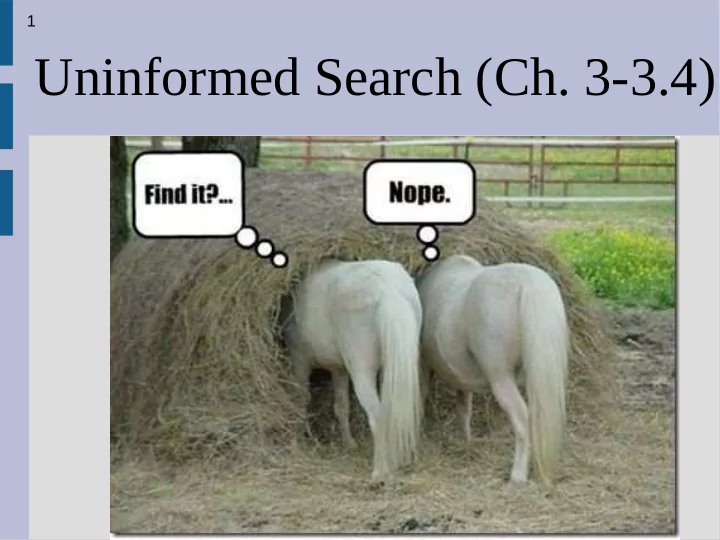

1 Uninformed Search (Ch. 3-3.4)
2 Breadth first search BFS can be implemented by using a simple FIFO (first in, first out) queue to track the fringe/frontier/unexplored nodes Metrics for BFS: Complete (i.e. guaranteed to find solution if exists) Non-optimal (unless uniform path cost) Time complexity = O(b d ) Space complexity = O(b d )
3 Depth first search Metrics: 1. Might not terminate (not correct) (e.g. in vacuum world, if first expand is action L) 2. Non-optimal (just... no) 3. Time complexity = O(b m ) 4. Space complexity = O(b*m) Only way this is better than BFS is the space complexity...
4 Uniform-cost search Uniform-cost search also does a queue, but uses a priority queue based on the cost (the lowest cost node is chosen to be explored)
5 Uniform-cost search The only modification is when exploring a node we cannot disregard it if it has already been explored by another node We might have found a shorter path and thus need to update the cost on that node We also do not terminate when we find a goal, but instead when the goal has the lowest cost in the queue.
6 Uniform-cost search UCS is.. 1. Complete (if costs strictly greater than 0) 2. Optimal However.... 3&4. Time complexity = space complexity = O(b 1+C*/min(path cost) ), where C* cost of optimal solution (much worse than BFS)
7 Depth limited search DFS by itself is not great, but it has two (very) useful modifications Depth limited search runs normal DFS, but if it is at a specified depth limit, you cannot have children (i.e. take another action) Typically with a little more knowledge, you can create a reasonable limit and makes the algorithm correct
8 Depth limited search However, if you pick the depth limit before d, you will not find a solution (not correct, but will terminate)
9 Iterative deepening DFS Probably the most useful uninformed search is iterative deepening DFS This search performs depth limited search with maximum depth 1, then maximum depth 2, then 3... until it finds a solution
10 Iterative deepening DFS
11 Iterative deepening DFS The first few states do get re-checked multiple times in IDS, however it is not too many When you find the solution at depth d, depth 1 is expanded d times (at most b of them) The second depth are expanded d-1 times (at most b 2 of them) Thus
12 Iterative deepening DFS Metrics: 1. Complete 2. Non-optimal (unless uniform cost) 3. O(b d ) 4. O(b*d) Thus IDS is better in every way than BFS (asymptotically) Best uninformed we will talk about
13 Bidirectional search Bidirectional search starts from both the goal and start (using BFS) until the trees meet This is better as 2*(b d/2 ) < b d (the space is much worse than IDS, so only applicable to small problems)
14 Uninformed search
Recommend
More recommend